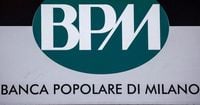The European Central Bank (ECB) has issued a negative opinion regarding Banco BPM's request to apply the so-called Danish Compromise in its public purchase offer (OPA) for Anima Holding. This decision, which is not final and rests with the European Banking Authority (EBA), has significant implications for the Italian bank's acquisition strategy.
On March 26, 2025, Banco BPM confirmed that the ECB's supervisory body communicated its conservative view on the prudential treatment of the acquisition of Anima, stating that the Danish Compromise would not apply to this transaction. The Danish Compromise is a regulatory framework that allows banks to treat insurance holdings more favorably in terms of capital requirements, thus reducing the capital absorption during acquisitions.
Banco BPM's CEO, Giuseppe Castagna, had previously expressed confidence that the ECB would grant the necessary approval, noting that the bank had already obtained financial conglomerate status, which typically qualifies it for such regulatory benefits. However, the ECB's recent communication has cast doubt on this assumption, leading to a decline in Banco BPM's share price.
In response to the ECB's opinion, Banco BPM clarified that the communication does not constitute a definitive decision and that the EBA will ultimately determine the matter. The bank is currently engaged in discussions with the ECB while awaiting the EBA's official ruling. As a result of the news, Banco BPM's shares dropped by approximately 5%, reflecting investor concerns about the potential financial impact of the ECB's stance.
Banco BPM's acquisition of Anima, launched on March 17, 2025, requires the bank to exceed a minimum acceptance threshold of 45% of Anima's capital. As of now, the bank has reportedly achieved 47.24% acceptance, meeting the initial condition for the offer's effectiveness. However, without the favorable capital treatment provided by the Danish Compromise, the acquisition is expected to impose a significant capital burden on Banco BPM, potentially reducing its core capital ratio by 268 basis points instead of the anticipated 30 basis points.
The implications of this decision extend beyond Banco BPM. Other banks, including BNP Paribas, are also seeking to utilize the Danish Compromise for their acquisitions. The ECB's negative opinion could complicate these transactions, making them more expensive and potentially affecting consolidation efforts across the European financial sector.
Banco BPM's strategic plan for 2024-2027, announced in February, accounted for the possibility of not applying the Danish Compromise. The bank has indicated that even in a worst-case scenario, its common equity tier 1 (CET1) ratio would remain above 13%, compared to 14.4% under the base scenario with the Danish Compromise. This plan aims to distribute approximately 6 billion euros to shareholders, significantly higher than previous targets.
As the situation unfolds, the upcoming board meeting on March 27, 2025, will be crucial for Banco BPM as it discusses the next steps regarding the OPA for Anima and the implications of the ECB's opinion. The outcome of this meeting could determine the future of Banco BPM's acquisition strategy and its ability to navigate the challenges posed by regulatory scrutiny.
In parallel, UniCredit, which has launched its own bid for Banco BPM, is closely monitoring the developments. The lack of the Danish Compromise could cost UniCredit an additional 44 basis points in its core capital ratio, should it proceed with its acquisition of Banco BPM. This interlinked nature of the transactions highlights the broader implications of regulatory decisions in the banking sector.
Ultimately, the fate of Banco BPM's acquisition of Anima remains uncertain as the bank awaits the EBA's final decision on the Danish Compromise. Stakeholders across the banking industry are keenly observing how this situation will unfold, as it could set a precedent for future acquisitions and regulatory practices within the European financial landscape.







